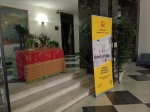25 years: February 11, 1994 / February 11, 2019

The Pontifical Academy for Life has reached the important milestone of its first 25 years of life.
Pope Francis in the Letter Humana Communitas summarizes the results achieved and relaunches the objectives of the future.
"In our time, the Church is called once more to propose the humanism of the life that bursts forth from God’s passion for human beings. Our commitment to valuing, supporting and defending the life of every human being is ultimately motivated by God’s unconditional love. (...)
That passion has inspired the work of the Pontifical Academy for Life from the time it was created twenty-five years ago by Saint John Paul II at the prompting of the eminent scientist and Servant of God Jérôme Lejeune. Recognizing the rapid and sweeping changes taking place in biomedicine, Pope John Paul saw the need for a more structured and organic approach and engagement in this area. The new statutes of the Academy, issued on 18 October 2016, have given renewed impetus to its activities. The goal of the statutes is to make the Academy’s reflection on human life issues ever more attuned to the contemporary scene. The ever-quickening pace of technological and scientific innovation, and the phenomenon of globalization have multiplied interactions between cultures, religions and different fields of study, and among the many dimensions of our human family and the earth, our common home. (...)
We need to enter into the language and lives of men and women today, making the Gospel message incarnate in their concrete experiences, as the Council demanded. To appreciate the meaning of human life, we should begin with the experience of procreation; this will enable us to avoid reducing life merely to a biological concept or a universal abstraction divorced from relationships and from history. (...)
The prospect of a global bioethics, with a broad vision and a concern for the impact of the environment on life and health, offers a significant opportunity for strengthening the new covenant between the Gospel and creation. Our shared humanity demands a global approach to the questions raised by the dialogue between diverse cultures and societies that, in today’s world, are in increasingly close contact. May the Academy for Life be a place for courageous dialogue in the service of the common good. I encourage you not to be afraid to advance arguments and formulations that can serve as a basis for intercultural and interreligious, as well as interdisciplinary, exchanges. But also to take part in the discussion of human rights, which are central to the search for universally acceptable criteria for decisions. At stake is the understanding and exercise of a justice that demonstrates the essential role of responsibility in the discussion of human rights and about their close correlation with duties, beginning with solidarity with those in greatest need. (...)
Another area calling for study is that of the new technologies described as “emergent” and “convergent.” These include information and communication technologies, biotechnologies, nanotechnologies and robotics. Relying on results obtained from physics, genetics and neuroscience, as well as on increasingly powerful computing capabilities, profound interventions on living organisms are now possible. Even the human body is subject to interventions capable of modifying not only its functions and capabilities, but also its ways of relating on personal and societal levels, with the result that it is increasingly exposed to market forces. There is a pressing need, then, to understand these epochal changes and new frontiers in order to determine how to place them at the service of the human person, while respecting and promoting the intrinsic dignity of all. This task is extremely demanding, given its complexity and the unpredictability of future developments; consequently, it requires even greater discernment than usual. (...)
The kind of medicine, economy, technology and politics that develop within the modern city of man must also, and above all, remain subject to the judgment rendered by the peripheries of the earth. Indeed, the many extraordinary resources made available to human beings by scientific and technological research could overshadow the joy of fraternal sharing and the beauty of common undertakings, unless they find their meaning in advancing that joy and beauty. We should keep in mind that fraternity remains the unkept promise of modernity. The universal spirit of fraternity that grows by mutual trust – within modern civil society and between peoples and nations – appears much weakened. The strengthening of fraternity, generated in the human family by the worship of God in spirit and truth, is the new frontier of Christianity".



